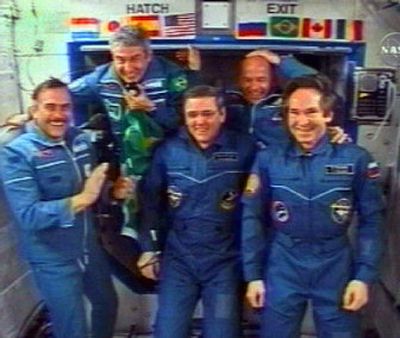Brazil’s first astronaut arrives at space station

KOROLYOV, Russia – Brazil’s first man in space floated into the International Space Station with his country’s flag and a beaming smile Saturday, accompanied by his Russian and American crewmates as applause and tears broke out at Mission Control.
American Jeffrey Williams, Russian Pavel Vinogradov and Brazilian Marcos C. Pontes entered the station after a cramped two-day journey in a Russian-built Soyuz capsule.
“This is the International Space Station,” a Mission Control announcer intoned after the air locks opened and the crew greeted the two men who have occupied the station for the past six months.
“The train does not go any further, please leave the cars,” he said, imitating the announcement made at the end of each line on the Moscow subway system.
Dozens of officials from all three countries fell into hushed silence at Russia’s Mission Control Center in Korolyov, outside Moscow, as the capsule neared the station, then began applauding when contact was made.
The TMA-8 capsule, which blasted off from the Baikonur cosmodrome in Kazakhstan on Thursday, latched on to the station some 250 miles above the Earth on Saturday, guided into place automatically by computers.
Vinogradov and Williams will replace the current crew for six months on the orbiting station, while Pontes will return to Earth on April 9.
“It’s certainly a treat,” said American William McArthur who, along with Russian Valery Tokarev, has been on the station since October. “It seems like it was just a week ago that Jeff and I were training together at Baikonur.”
McArthur and Tokarev will return to Earth with Pontes.
Floating into the station’s main compartment, Pontes grinned and quickly unfurled a Brazilian flag. He also brought a Brazil soccer jersey, hoping it would bring his national team victory in this summer’s World Cup.
A 43-year-old father of two whose interests range from weightlifting to watercolor painting, Pontes is a Brazilian Air Force lieutenant colonel who has logged over 1,900 flight hours in more than 20 different aircraft, including both American and Russian-made fighter jets.
“I think it’s safe now to call him a cosmonaut,” said Nikolai Sevastyanov, the head of the state-controlled RKK Energiya company that built the Soyuz craft.
“Until the very moment that he returns to Earth, all Brazilians will be following him in their hearts,” said Raimondo Mussi, a Brazilian space agency official who monitored the docking at Mission Control.